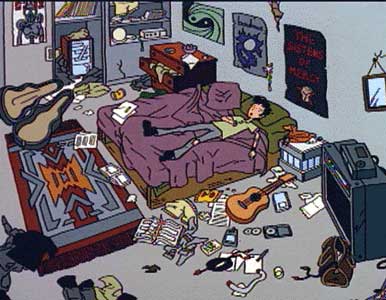In A Strange and Sublime Address by Amit Chaudhuri, Sandeep, an only child living in a Bombay high-rise, spends a summer visiting his Uncle's house in Calcutta with his mother. On Sundays, his uncle sings aloud to himself during his leisurely preluncheon bath, the notes echoing in the enclosed space of the bathroom 'like rays of trapped light darting this way and that in a crystal'.
He usually sang old, half-remembered compositions that had been popular thirty of forty years ago in a Bengal where the radio and the windup gramophone were still new and incredible machines breaking the millennial silence of the towns and villages:
Godhulir chhaya pathe
Je gelo chini go tare.
Knocking on the bathroom door, Sandeep made a pest of himself by asking: " Chhotomama, what does godhuli mean?"
Lost in the general well-being of cleansing himself, his uncle replied patiently: "The word go means 'cow',and the word dhuli means 'dust'. In the villages, evening's the time the cowherds bring the cattle home. The herd returns, raising clouds from the road. Godhuli is that hour of cow dust. So it means 'dusk' or 'evening'."
As Chhotomama explained, his voice emerging from behind the steady sound of water, Sandeep saw it in his mind like a film being shown from a projector - the slow-moving, indolent cows, their nostrils and their shining eyes, the faint white outline of the cowherd, the sense of the expectant village (a group of scattered huts), and the dust, yes the dust, rising unwillingly from the cows' hooves and blurring everything. The mental picture was set in the greyish-red colour of twilight. It was strange how one word could contain a world within it.
Strange indeed! What is a word but a seemingly random arrangement of letters of the alphabet (which themselves are seemingly random shapes), or a seemingly random modulated sound? And yet, one single word can encompass whole Universes and more. The word godhuli does not just indicate a time of day, but conjures up a complete way of life.
Understanding words and phrases and the concepts they encapsulate brings us a long way toward understanding the people, and societies and cultures, who employ them. It's just amazing how, long after the dusk has given way to night, the dust from the cows' hooves has settled, and even the village itself has crumbled to dust, this word will remain, yielding its secrets to the deserving.
Friday, April 28, 2006
Tuesday, April 11, 2006
Finest Hour

I realize that it would be both unnecessary as well as futile to use this forum to sing the praise of public radio to the handful of amazingly awesome individuals known to occasionally frequent this corner of cyberspace; however, I do feel obligated to talk about a new show that I recently discovered almost by accident on KQED, which, along with KALW, is one of my local public radio stations. Radio Lab (from WNYC) is 'an investigation': each episode is usually designed to tackle One Big Idea which regularly turns out to be fairly ambitious in terms of its breadth and scope, and not only do they almost always succeed, the Radio Lab team actually manage to do so with verve and wit (and enough digressions) that keep the hour both engrossing and informative. From questions like 'How does the brain make me?' to exploring the nature of stress, from looking at the staggeringly complicated societies formed by bees and ants to examining the history and nature of time, Radio Lab is one fascinating journey where 'science bumps into culture' and 'information sounds like music'.
Season One of Radio Lab is archived here, and Season 2 begins April 14, 2006. I can hardly wait!
Subscribe to:
Posts (Atom)
